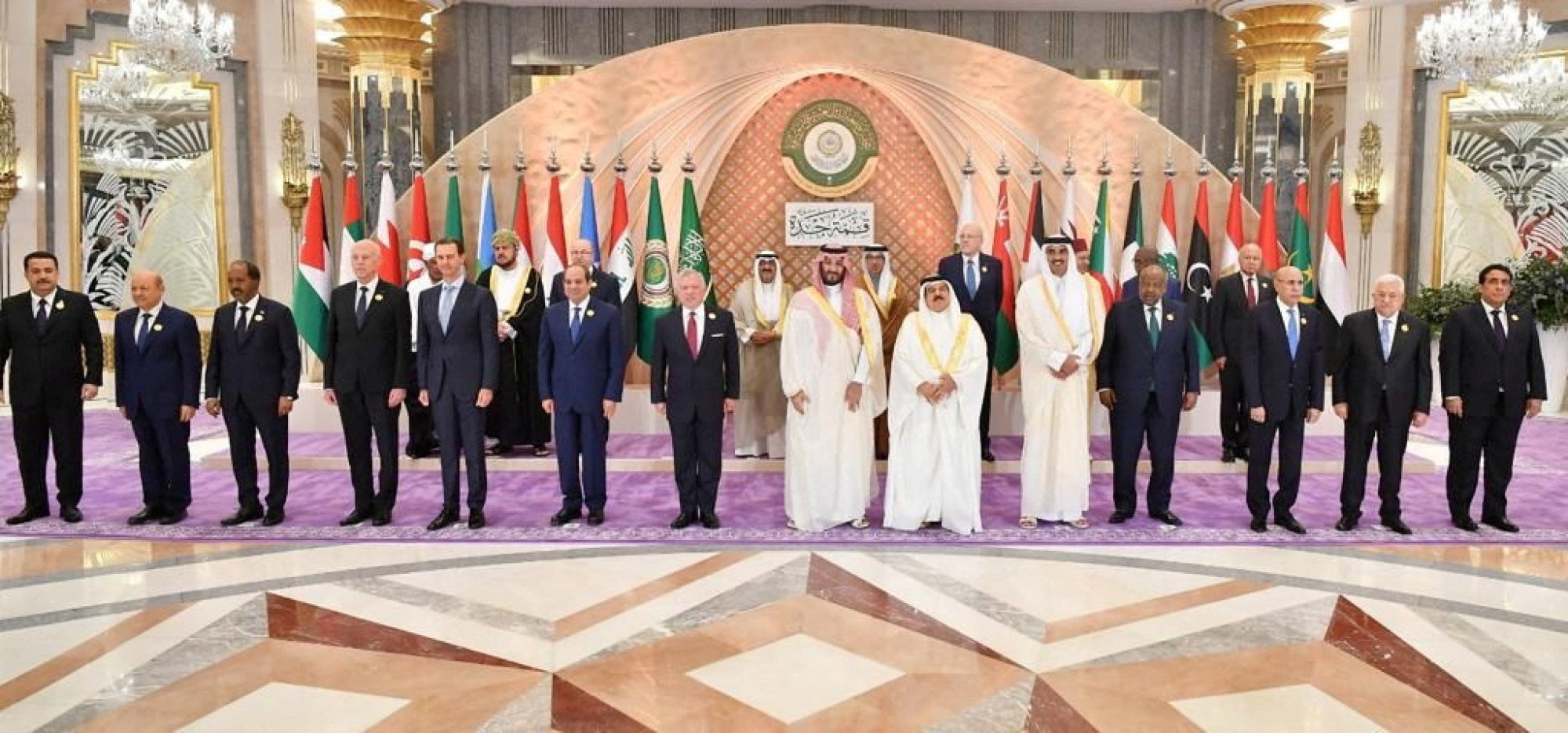Trump's Relationship With Arab Leaders: A Complex Alliance

Table of Contents
Economic Ties and Strategic Partnerships
Trump's administration prioritized strengthening economic ties and forging strategic partnerships with several Arab nations. This approach was characterized by significant arms deals and a focus on energy security.
Arms Deals and Military Cooperation
Massive arms sales to Arab nations were a cornerstone of Trump's policy, generating substantial economic benefits for both the US and its Arab partners. These deals also reflected a shift in strategic priorities.
- Saudi Arabia: The sale of billions of dollars worth of advanced weaponry, including fighter jets and missile defense systems, solidified the strategic partnership. This included the controversial $110 billion arms package announced in 2017, a deal that faced significant scrutiny due to Saudi Arabia's human rights record.
- United Arab Emirates (UAE): The UAE also received significant arms sales, bolstering its military capabilities and strengthening its position in regional conflicts. These sales included advanced fighter aircraft and precision-guided munitions.
- Strategic Implications: These arms deals strengthened US influence in the region, provided economic benefits for American defense contractors, and enhanced the military capabilities of key Arab allies, impacting regional power dynamics. However, the ethical implications of supplying arms to countries with questionable human rights records remained a major point of contention.
Energy Security and Trade Agreements
Energy security played a crucial role in shaping Trump's relationships with Arab leaders. The US's reliance on Middle Eastern oil, and the Arab states' need for American military and technological support, created a strong interdependent relationship.
- Oil and Gas Partnerships: Trump administration officials emphasized the importance of stable energy markets and strengthened cooperation with major oil-producing nations in the region to ensure a stable global energy supply.
- Trade Agreements: While no major new comprehensive trade agreements were signed, existing energy-related trade relationships were strengthened, reflecting the ongoing importance of oil and gas in the bilateral relationships.
- Implications for US Energy Independence: Although the Trump administration promoted energy independence, the continued reliance on Middle Eastern oil and gas underscored the complex interplay between energy security and geopolitical strategy.
Shared Concerns Regarding Iran
A shared concern about Iran's regional influence and nuclear ambitions became a unifying factor, driving closer cooperation between the US and several Arab nations under Trump's leadership.
The Abraham Accords and Regional Stability
The Abraham Accords, brokered by the Trump administration, normalized relations between Israel and several Arab nations (UAE, Bahrain, Sudan, and Morocco). This unprecedented diplomatic achievement was largely driven by shared concerns about Iran's destabilizing actions in the region.
- Countries Involved: The Abraham Accords significantly altered the regional landscape, bringing together previously estranged nations.
- Strategic Implications: The accords were hailed as a step towards greater regional stability and counterbalancing Iran's influence. However, critics questioned the long-term sustainability and overall impact.
- Challenges and Limitations: The accords did not resolve all conflicts in the region and faced criticism for failing to address underlying Palestinian issues.
Military Postures and Counter-Terrorism
Shared concerns about terrorism led to increased military cooperation and joint counter-terrorism efforts.
- Joint Military Exercises: The US and several Arab nations conducted joint military exercises, enhancing interoperability and demonstrating a commitment to regional security.
- Counter-Terrorism Strategies: While cooperation existed, disagreements persisted on the best approaches to counter-terrorism, particularly regarding the use of force and the role of regional proxy actors.
- Differing Approaches: The Trump administration's focus on prioritizing defeating ISIS sometimes overshadowed other concerns and led to criticisms that long-term strategic objectives were neglected.
Points of Contention and Criticism
Despite areas of cooperation, Trump's relationship with Arab leaders faced significant criticism. Human rights concerns and broader criticisms of his foreign policy approach generated considerable controversy.
Human Rights Concerns and Democratic Values
The Trump administration's prioritization of strategic partnerships over human rights concerns in certain Arab nations drew considerable international condemnation.
- Saudi Arabia's Human Rights Record: The murder of Jamal Khashoggi and broader concerns about human rights abuses in Saudi Arabia exposed the tension between geopolitical interests and human rights principles in Trump’s Middle East policy.
- Criticisms from Human Rights Organizations: Numerous human rights organizations criticized the administration's perceived reluctance to address human rights abuses in its dealings with Arab allies.
- International Condemnation: The administration faced international criticism for not adequately addressing these human rights issues.
Criticism of Trump's Approach to the Middle East
Trump's foreign policy in the Middle East faced widespread criticism for various reasons.
- Prioritizing Short-Term Gains: Critics argued that Trump prioritized short-term economic gains and transactional deals over long-term stability and the promotion of democratic values in the region.
- Withdrawal from the Iran Nuclear Deal: The decision to withdraw from the Iran nuclear deal was heavily criticized for potentially destabilizing the region and undermining international efforts to prevent Iran from acquiring nuclear weapons.
- Long-Term Consequences: Analysts warned about the potential long-term negative consequences of some of Trump’s actions, including weakened alliances, increased regional instability, and a rise in extremist ideologies.
Conclusion: Understanding Trump's Complex Alliance with Arab Leaders
Trump's relationship with Arab leaders was characterized by a complex interplay of economic interests, shared security concerns regarding Iran, and significant human rights controversies. While substantial economic partnerships and strategic alliances were forged, particularly through arms deals and the Abraham Accords, these achievements were often overshadowed by criticisms regarding human rights and concerns about the long-term consequences of a transactional approach to foreign policy. Understanding these nuanced dynamics is crucial to fully grasping the legacy of the Trump administration's engagement with the Arab world. To gain a more complete understanding of this intricate geopolitical landscape, further research into Trump's relationship with Arab leaders is crucial. Explore the diverse perspectives and ongoing debates surrounding this complex alliance.

Featured Posts
-
 Elaqt Twm Krwz Wana Dy Armas Hqyqt Alshayeat
May 17, 2025
Elaqt Twm Krwz Wana Dy Armas Hqyqt Alshayeat
May 17, 2025 -
 Donde Ver Crystal Palace Nottingham Forest En Directo
May 17, 2025
Donde Ver Crystal Palace Nottingham Forest En Directo
May 17, 2025 -
 Upstairs Downstairs Star Jean Marsh Dies At 90 Remembering A Tv Icon
May 17, 2025
Upstairs Downstairs Star Jean Marsh Dies At 90 Remembering A Tv Icon
May 17, 2025 -
 Navigating Japans Steep Government Bond Curve A Complex Investment Landscape
May 17, 2025
Navigating Japans Steep Government Bond Curve A Complex Investment Landscape
May 17, 2025 -
 Anunobys 27 Puntos Llevan A Los Knicks A La Victoria Sobre Los Sixers Que Encajan Su Novena Derrota Consecutiva
May 17, 2025
Anunobys 27 Puntos Llevan A Los Knicks A La Victoria Sobre Los Sixers Que Encajan Su Novena Derrota Consecutiva
May 17, 2025
